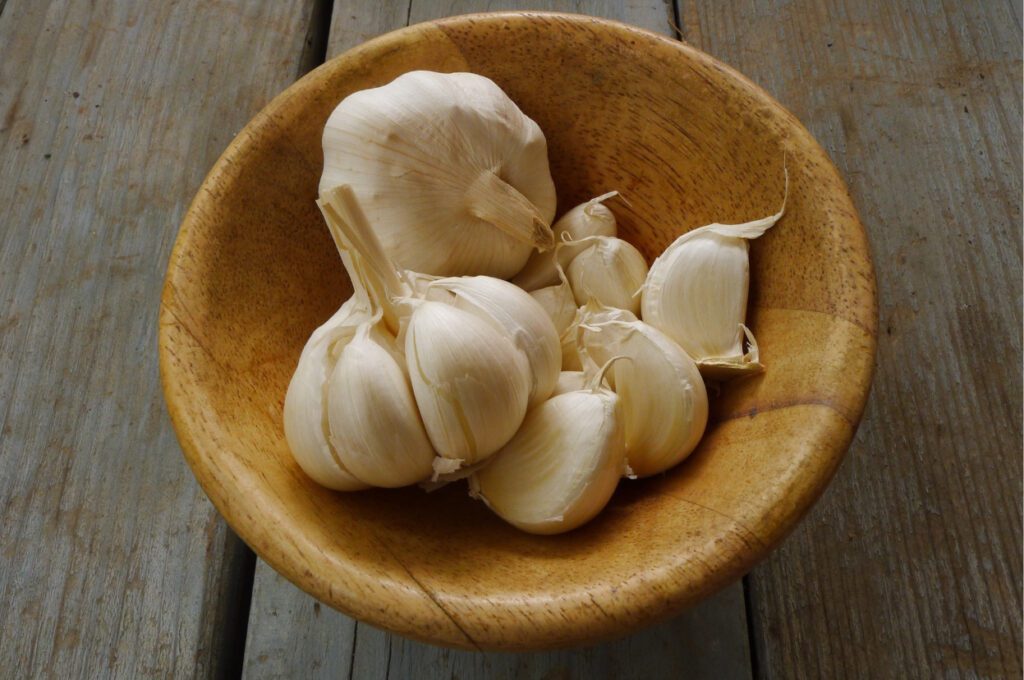Table of Contents
ToggleGarlic: Nature’s Remedy for a Healthier Heart
Garlic (Allium sativum) is more than just a kitchen staple. For centuries, it has been celebrated in traditional medicine for its health-boosting properties. Modern science backs these claims, particularly highlighting garlic’s potential to support cardiovascular health. For individuals concerned about coronary artery disease (CAD), garlic offers a natural, effective way to promote heart health and protect against this life-threatening condition.
Top Health Benefits of Garlic for Heart Health
1. Reducing Blood Pressure
High blood pressure is a leading contributor to CAD. Garlic’s active compound, allicin, helps relax blood vessels, promoting smoother blood flow and lowering blood pressure.
- Research-Backed Results: Studies indicate that regular garlic consumption leads to modest but significant reductions in blood pressure, which eases strain on the heart and supports long-term health.
2. Improving Cholesterol Levels
Garlic helps maintain a healthy lipid profile by targeting “bad” cholesterol.
- Lower LDL Cholesterol: Garlic reduces low-density lipoprotein (LDL), which contributes to plaque buildup in arteries.
- Higher HDL Cholesterol: It may also boost high-density lipoprotein (HDL), which aids in clearing excess cholesterol from the bloodstream.
- Plaque Prevention: This dual action reduces the risk of arterial blockages and CAD.
3. Anti-Inflammatory Effects
Chronic inflammation exacerbates artery damage, contributing to CAD progression.
- Sulfur Compounds: Garlic is rich in compounds that combat inflammation in the arteries, alleviating stress on the cardiovascular system.
- Slow Disease Progression: By addressing inflammation, garlic helps protect against further arterial damage and supports healthier heart function.
4. Antioxidant Protection
Free radicals, which cause oxidative stress, can damage the arterial lining and worsen CAD.
- Neutralizing Damage: Garlic’s antioxidants help combat these unstable molecules, protecting blood vessels from further harm.
- Reduced CAD Risk: This antioxidant effect supports the heart’s resilience and lowers the chances of complications.
5. Enhancing Blood Vessel Function
Garlic supports the health of the endothelium, the cell layer lining blood vessels.
- Improved Circulation: Bioactive compounds in garlic promote vasodilation, enhancing blood flow and preventing clots.
- Lower Clot Risk: By reducing the likelihood of clots, garlic provides an extra layer of protection against CAD-related events like strokes and heart attacks.
Precautions When Using Garlic
While garlic is a natural remedy, it’s essential to use it responsibly:
- Consult Your Healthcare Provider: Garlic may interact with blood thinners or medications affecting clotting. Speak with a doctor before using garlic supplements.
- Digestive Sensitivity: Start with small amounts if you’re prone to bloating or gas, as garlic can irritate the digestive system in some people.
- Use in Moderation: Balance is key—too much garlic can lead to side effects like nausea or an upset stomach.
Where Garlic Grows
Garlic is cultivated worldwide, with China leading global production, followed by countries like India, Bangladesh, Egypt, and South Korea. It is also grown across Russia, Spain, and parts of North America, making it widely accessible.
How to Incorporate Garlic into Your Routine
- Raw Garlic: Consuming fresh garlic releases allicin, the compound responsible for many of its health benefits. Crush or chop garlic to maximize its potency.
- Cooked Garlic: While heating reduces allicin content, cooked garlic still offers a wealth of antioxidants and flavor.
- Garlic Supplements: Capsules or tablets can provide a concentrated dose of allicin for individuals who prefer a convenient option.
Conclusion
Garlic is a versatile and powerful ally in maintaining heart health. Its ability to lower blood pressure, improve cholesterol levels, combat inflammation, and enhance endothelial function makes it a valuable natural remedy for preventing and managing coronary artery disease.
By incorporating garlic into your daily routine, you can take a simple yet effective step toward better cardiovascular health. Always consult with a healthcare provider before making significant dietary changes or starting supplements, especially if you have existing health conditions.
References
- Ried, K., Toben, C., & Fakler, P. (2013). Effect of garlic on blood pressure: A systematic review and meta-analysis. BMC Cardiovascular Disorders, 13, 13.
Read Study - Ried, K., & Toben, C. (2010). Garlic reduces cardiovascular risk in patients with coronary artery disease. The American Journal of Clinical Nutrition, 91(3), 655-664.
Explore Research - The Role of Garlic in Cardiovascular Health: Current Evidence. National Institutes of Health (NIH).
Learn More - “The Heart-Healthy Benefits of Garlic” – Cleveland Clinic Health Essentials
https://health.clevelandclinic.org/heart-healthy-benefits-garlic/
This article explores how garlic supports cardiovascular health, including its effects on cholesterol and blood pressure. - “Garlic and Heart Disease: How This Herb Supports Cardiovascular Health” – Healthline
https://www.healthline.com/nutrition/benefits-of-garlic-for-heart-health
A detailed blog post outlining garlic’s heart-boosting benefits, focusing on its antioxidant and anti-inflammatory properties. - Coronary Artery Disease: Symptoms, Causes, and Heart Health Tips
- Understanding Hypertension: Causes, Symptoms, and Effective BP Control

Alaa Alhashlamon, a professional pharmacist specializing in pharmaceuticals, patient wellness, and healthcare advice. Explore articles on safe medication practices, health tips, and the latest in pharmacy.








